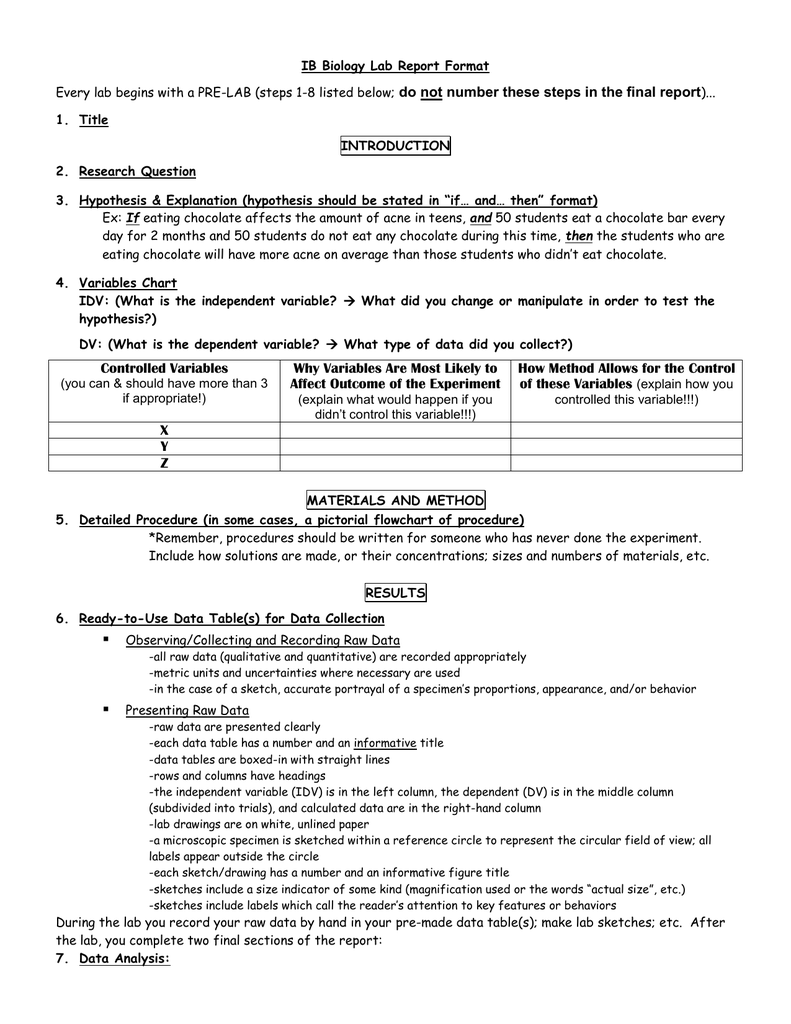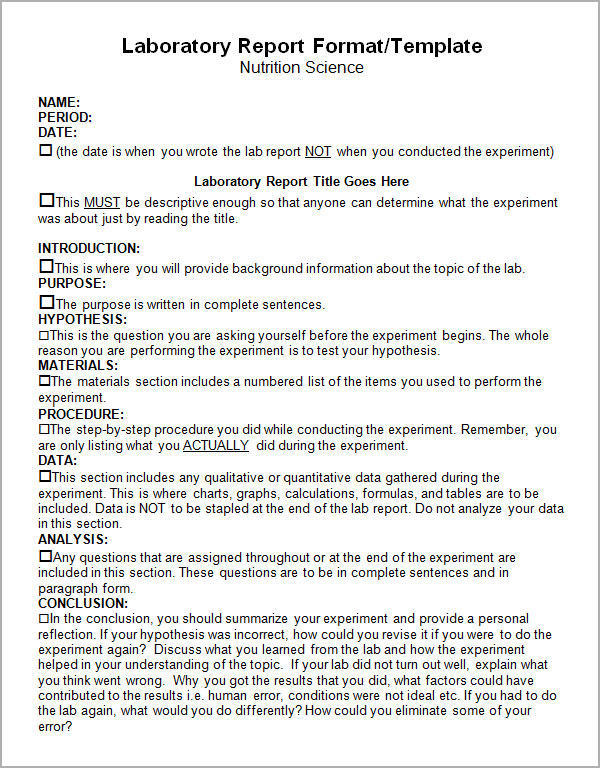
Lab Report Format3 - 1 - Format for Formal Lab Reports Revised January 7, A formal lab report is a record of your laboratory activities and should include the following sections: Introduction, Experimental Procedure, Data, Analysis and Discussion and Conclusion. Each section is required to have a heading and should be neat, well Aug 10, · Lab reports are an essential part of scientific study and knowledge. For any chemistry lab report, you will need to write down or type the entire procedure and everything observed during the lab activity. Any lab report should allow the person reading it to be able to reproduce the exact procedure (and result, hopefully) carried out in the lab General Chemistry Lab Reports The introduction section of a lab report provides the background and significance of the experiment. When writing an introduction section, include the following: 1. Hypothesis. Describe what prediction is being tested by the experiment (that is, answer the questions
How to Write a Chemistry Lab Report: 14 Steps (with Pictures)
Last Updated: August 10, References, writing a biology lab report. This article was co-authored by Meredith Juncker, writing a biology lab report, PhD. Meredith Juncker is a PhD candidate in Biochemistry and Molecular Biology at Louisiana State University Health Sciences Center. Her studies are focused on proteins and neurodegenerative diseases, writing a biology lab report. This article has been viewed 94, times. Lab reports are an essential part of scientific study and knowledge.
For any chemistry lab report, you will need to write down or type the entire procedure and everything observed during the lab activity. Any lab report should allow the person reading it to be able to reproduce the exact procedure and result, hopefully carried out in the lab.
Keep in mind that each course might have slightly different requirements for the details of the report as well as writing a biology lab report it should be handwritten or typed -- this article gives you an overview of typical components.
To write a chemistry lab report, start by describing your experiment and your hypothesis, or what you think will happen. Include the Reaction Equation, which you is the chemical reaction that you are going to be conducting, including the reactants and products and their structure. For tips on writing your introduction and conclusion, read on!
Did this summary help you? Yes No. Log in Social login does not work in incognito and private browsers. Please log in with your username or email to continue. wikiHow Account. No account yet? Create an account. Community Dashboard Write an Article Request a New Article More Ideas Edit this Article.
Courses New Tech Help Pro New Expert Videos About wikiHow Pro Upgrade Sign In. Home Random Browse Articles Courses New About wikiHow Easy Ways to Help Approve Questions Fix Spelling Quiz App More Things to Try We use cookies to make wikiHow great.
By using our site, you agree to our cookie policy. Cookie Settings. wikiHow is where trusted research and expert knowledge come together. Learn why people trust wikiHow. Categories Education and Communications Writing Non Fiction Science Writing How to Write a Chemistry Lab Report. Download Article Explore this Article parts.
Related Articles. Article Summary. Co-authored by Meredith Juncker, PhD Last Updated: August 10, References. Part 1. Familiarize yourself with the lab manual. This is the outline and instructions given to you by your teacher or professor. Make sure you understand exactly what you are doing and why.
If you have questions, make sure you bring them up with the instructor before class. Pay careful attention to the safety precautions writing a biology lab report for the type of experiment you're doing.
You writing a biology lab report need to incorporate these into your lab report. Know the format. Laboratory reports have a particular written style. Unlike creative essays or papers for humanities classes, a report for chemistry is not supposed to have your own personal stamp on it.
The essential writing elements are: [1] X Research source Write in complete sentences. Most of your report should use present tense verbs, unless you are explaining what you did in the experiment, or what has been written in the past about it. What do you think this experiment will do?
What will you learn? Hypothesizing, writing a biology lab report, or making an informed guess about what the result of the experiment will be, writing a biology lab report, is one of the key elements in any scientific experiment. Though there are elements that will appear in all lab reports, each instructor might have different expectations.
Part 2. Start with your title, personal, and class information. Make sure you follow your instructor's preferred order. If he or she didn't express a preference, begin with the title of the experiment writing a biology lab report are going to conduct.
Any lab report will need to include your name and the name of your lab partner s and their email addresses. Also provide the date that you did the experiment, the name of the teacher or professor, and the class name, number, and section number if applicable. net Partner: Jose Marques jmarques wonderful. net CHEM July 14, Professor Lewis. Leave space at the beginning for your abstract.
This will be the part where you sum up your work. You will tell the reader what you did and why, and then the results. Write an Introduction. This will give your reader the basics of the experiment you will be conducting.
Next, explain the gap in research that you will be testing. State your hypothesis, as well as how you will test it. Your introduction will answer the following questions: What do we know beforehand previous knowledge or research around the experiment? Why did you choose to do this experiment? What was the purpose of the experiment? What do you believe you will discover? Why do you believe that your experiment will turn out in a particular way?
Part 3. Include the Reaction Equation, writing a biology lab report. You can typically find this in the lab manual for the class. It is the chemical reaction that you are going to be conducting, laid out with the reactants and products labeled and their structure.
You will also need to indicate the temperature of the experiment and the solvent. Conduct the Experimental Section. This is the part where you will conduct the experiment and write down every step. Do not just copy the lab manual -- tell the reader what happened in your particular experiment. Document everything as you are going through the process.
Here's an example: "Using a burner, writing a biology lab report, we heated Liquid XO and YO to 50 degrees Celsius. We verified the temperature with a thermometer. We poured the liquids into a third tube, which we'd heated to 50 degrees Celsius. The combination of the 2 liquids formed an O2 gas and Liquid XY inside the tube.
Record your results. At the end of the Experimental Section, you need to let the reader know exactly what emerged from your experiment.
Be sure to use the proper format. Record every single thing that happened, even if it seems insignificant or silly. The appropriate order is: [6] X Research source Name and amount in grams of the final product Melting point of the final product with the known literature value Gas Chromatography Mass Spectroscopy GCMS data H NMR data Infrared Spectroscopy IR data.
Write a Results and Discussion Section. This is where you analyze your results and whether your experiment went writing a biology lab report expected. If not, why not? How did the experiment match or not your hypothesis? Were there problems in doing the experiment that might have affected the results?
As part of this section, write a paragraph about how your results could be used in the future, or the future direction research could go based on your findings. Part 4. Write a Conclusion. In a short and concise section, sum up what you learned from the experiment and whether it went as you thought. Unlike the Writing a biology lab report and Discussion Section, the Conclusion is more focused on the broad ideas brought up in your introduction than the specifics of your particular experiment.
Cite your sources. Be sure to include the lab manual.
Introduction to Science Writing for biology lab reports
, time: 2:43
Aug 10, · Lab reports are an essential part of scientific study and knowledge. For any chemistry lab report, you will need to write down or type the entire procedure and everything observed during the lab activity. Any lab report should allow the person reading it to be able to reproduce the exact procedure (and result, hopefully) carried out in the lab Feb 03, · Lab reports are an essential part of all laboratory courses and usually a significant part of your grade. If your instructor gives you an outline for how to write a lab report, use that. Some instructors require a lab report to be included in a lab notebook, while others will request a separate report. Here's a format for a lab report you can General Chemistry Lab Reports The introduction section of a lab report provides the background and significance of the experiment. When writing an introduction section, include the following: 1. Hypothesis. Describe what prediction is being tested by the experiment (that is, answer the questions
No comments:
Post a Comment